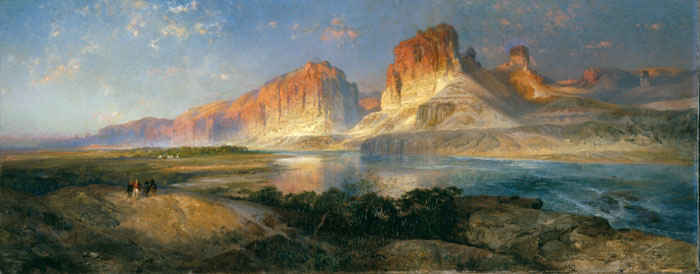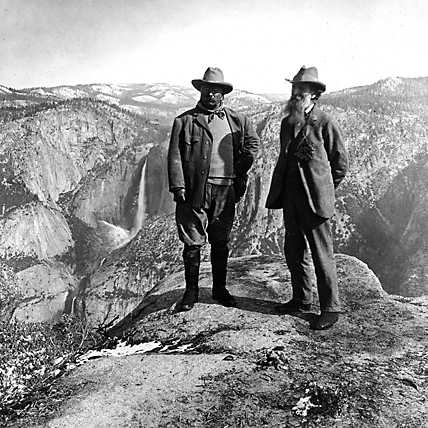
Goals of the Course
We will also analyze the arguments presented by some of the nationÕs most thought provoking authors, including Carolyn Merchant, Roderick Nash, Donald Worster, and Henry David Thoreau.
More practically, participants will have opportunities to hone their skills in reading analytically, in verbally discussing ideas about governmentÕs regulatory role in an encouraging setting, and in expressing your ideas in writing as you learn throughout the term.
Especially in our class, I would hope, now and again, you will experience the delight and enjoyment of being moved by the power of ideas and well-stated prose to lift your spirits, or to amend your behavior, or nourish your more curious sensibilities. I hope these concepts may move you to act responsibly as one means to improve our world based on this legacy of landscape, air, and water protection that we hold in trust.
Texts
Merchant, Reisner, Thoreau, Mumford, Austin, Egan, and Rome. (See readings, p. 3.)
- Regular, punctual attendance with alert & active participation in class
- Preparation for and participation in the class by bringing the texts and /or assigned questions answered to the group for analysis on our meeting days; or by verbally sharing the free-writing we do in classes with other participants.
- Two, – three to five page, – exploratory narrative essays – on an assigned topic a week before they are due based on evidence from the assigned readings: March 5, 24, 31.
- One, – six to eight pages. – Final paper
with footnotes, bibliography, tables and pertinent photographical or
artistic representations with the appropriate citation of its source
and a phrase explaining their purpose: April 7. The final orals & written
exam are based on this.

Grades: all assignments are graded with careful attention to each of these criteria: {CLIFS}
1. C clarity, coherence, spelling, grammar & logical consistency
2. L length & development of your arguments, ideas, or presentations
3. I information from the class texts, library research, or interviews
4. F frequency of examples from the lectures, journal, notes & readings
5. S subject developed as argued in a thesis, introduction, summaries, & conclusion.
The names and phone numbers of two other students in the class:
1. _______________________________2. –––––––––––––––––––––––––––––––
My policies:
I am here to encourage you to excel in learning new concepts and practicing your writing and speaking abilities in an effort to create meaningful discourse. My purpose is to feed your inquiring intellect with significant ideas in a coherent and challenging manner. I anticipate you will ask questions and actively work together to overcome the challenges the course material may pose for you in achieving an excellent level of performance based on an improved understanding of the readings. I recommend you to discuss ideas, passages, and assignments during my office hours.
Active learning
Keep in mind that participation in this course involves not only alertness and contributing your ideas to the class, but also listening respectfully without interrupting other speakers who are presenting their views on the assigned readings. Paying attention to others and to me is a sign of respect that I seek to reward in all my classes. The use of electronic media for other than class purposes is forbidden and is treated as an absence if you are texting, surfing, e-mailing or digitally inattentive to our discussion during class meetings.
Late papers
Submit all assigned work at the beginning of the class on the day the assigned work is due. Late papers cannot receive the same credit as those received on time in fairness to the punctual students. This is also because we discuss the importance of what you have said in the class the day the essays are due. Always back-up your work as you write, start at least a week before, and always keep a printed copy of the material you turn into me.
Paper format
The look of a college paper is always a professional document with an accurate date and page numbers indicating when the work was completed. I ask you to place a cover page with your name, phone number, essay title and an abstract of two to three sentences covering the substance of your essay for purposes of privacy because I make extensive comments on your work. Spelling and grammar errors are unacceptable. All papers are to be typed double spaced in either Arial or times new roman font and should have one inch margins and 22-23 lines to the page as a minimum.
Academic honesty and plagiarism
Cheating or copying without proper citation amounts to plagiarism and is the most serious academic offense of novices and professionals alike. By the use of words or ideas that are not your own and are either insufficiently acknowledged or not acknowledged at all you commit the offense. The consequences are that you can fail the assignment, or even the class, since every offense is a violation of the CollegeÕs honor code. As such, I report such violations to the Deans office.

Assignments description due value
Attending & active discussing of books daily 15%
Exam Feb. 19 20%
Essay on ecological changes Mar. 5, & 24 20%
Role-play: write up researched positions Mar. 31 10%
Essay on conservationÕs origins as a problem April. 7 20% Final exam–essay & oral presentation (5%) April 21, May. 5, 11 AM 15%
Schedule: Month and days
January
13 Maps of the place you call home. –What do you want to learn?
15 image and place in history: Merchant pp. 1-26. http://web65.rollins.edu/~jsiry/America_Early.html
20 ŌBeyond, Beneath & Behind the Wild Frontier" http://web65.rollins.edu/~jsiry/wilder.html
22 time and cycles of change, Merchant pp. 79-83. http://web65.rollins.edu/~jsiry/ehless1.html
27 multiple media - Images of the land Merchant, pp, 58-79, Reisner, pp. 1-14.
29 Aboriginal America Merchant, pp. 28-63, 95-104, Reisner, pp. 15-51. (Native peoples)
February
3 Settlement, Merchant, pp. 105-128. Reisner, pp.52-103.
5 American revolution & nationalism, Merchant, pp. 129-164. Reisner, pp. 104-119.
10 Donald Worster, Merchant, pp. 2-9, 295-300, 457-448.
12 DarwinÕs Birthday, 1809. Merchant, pp. 186-202.
17 verbal exam – responding to oral questions: Reisner, pp. 120-168.
19 Exam 70 minutes, short essay, completion, ID and matching.
24 Emerson, Bryant & promise of landscape Merchant, pp. 166—178.
26 Transcendentalism, Merchant, pp. 178-181.
March
3 Thoreau, ecologist, Civil Disobedience, pp. 1-18, Merchant, pp.181-184
5 Essay draft due on evidence for ecological changes. http://web65.rollins.edu/~jsiry/Mermod.html
7-15 Spring Break
17 Thoreau Civil Disobedience, pp. 19-38. Merchant, pp. 204-211.
19 Mumford The Brown Decades, pp. 1-25.
24 Essay due on evidence for ecological changes http://web65.rollins.edu/~jsiry/Mermod.html
26 Reisner and the reclamation effort Merchant, pp. 312-321. Reisner, pp. 169-254
31 Grand Canyon controversy, Merchant, pp. 321-350, Reisner, 255-305, Egan, pp.1-72.
Write up a defense or criticism of damming the Grand Canyon, 3 pages.
April
2 Rivers, Merchant, pp. 467-500. Egan, The Worst Hard Times, pp. 73-127.
7 Essay due on —ConservationÕs origins and preservation rift. Merchant, pp.503-506.
9 Dust Bowl, Egan, The Worst Hard Times, pp. 128-312.
14 Mary Austin, Land of Little Rain, (all)
16 Rome, Bulldozer in the Countryside, pp. x-270.
21 What is worth protecting? How did conservation fail? Start of Final Exam related presentations
24 What is worth protecting? How did conservation fail? Ō Ō Ō Ō Ō
28 What is worth protecting? How did conservation fail? End of verbal presentations. last day of term
May 5: 11 AM to 1 PM, Tuesday is the Final Exam (essays) you must attend or fail the course.

Changes in the Schedule
If alterations of this published schedule must occur I will announce them in class. If you are absent, telephone one of your classmates to ascertain that dayÕs announced changes, if any.
Readings:
Merchant, Problems in American Environmental History
Thoreau, Civil Disobedience.
Mumford, The Brown Decades.
Austin, Land of little Rain.
Reisner, Cadillac Desert.
Egan, The Worst Hard Time.
Rome, Bulldozer in the Countryside.
Final exam question:

What is worth protecting in America and how do we pay to preserve that for future generations to appreciate, use, or pass on?
Formal papers.
These essays are based on the readings and discussions. All papers should be have a title based on your contents, with its principle authorÕs full name and phone number, date completed, and with page numbers on the upper right hand corner. The essay should follow the style and content of papers in the Rollins Undergraduate Research Journal and it should be double spaced, 12pt font (either Times/Times Roman or Arial) and at least 5 pages long, excluding the Literature Cited page and any notes, figures, photos, or graphs you may use (see –ask Pete Ives in TJs--for Instructions to Authors). The final review paper for the term must be handed in no later than 17 April 2009. Of course you are very welcome to hand it in earlier and you are also encouraged to discuss it with me and submit a draft to me for review and comments before final submission.
Appointment: You get credit for visiting the writing consultants, and in your writing you get credit for using all of the authors. Also, you make at least one appointment with me before mid-term to discuss your research interests in the class. IÕm here to reward you for doing excellent work & to assist you in pursuing hard questions.
The extent and influence of biological revolutions in our nation's past are the focus of this class. Your comments and essays should examine geographical evidence to decide how well humans adapted to climatic changes that altered vegetation, animals, and landscape. As we explore further, this inquiry reveals that humans are active agents, changing the EarthÕs very surface.
Use this documentary analysis of art, literature, maps, photographs, and population in your writings. Exams and essays will emphasize the people and their ideas who noticed the extent to which humans substantially transformed America's diverse geography over five centuries.
The ecological themes we read and discuss should generate questions about how well we know these past threats to our physical life support system, its biological diversity, and this planet's fragile human freight. Each of you must decide together how threatened are the landscapes and resources on which our technologically advanced society depends.
Exam, —70 minutes—fill in, matching and short essays, based on Reisner, Siry, & Merchant.
Essay, What evidence exists for ecological changes the nationÕs past? Reisner, Thoreau, Mumford, Merchant & Olmsted.
Essay, Essay on ConservationÕs origins and rift with preservation. Mumford, Austin, Egan, Merchant, Siry.
Orals, answer the question: What is worth protecting in America and how do we pay to preserve that for future generations to appreciate, use, or pass on? (all authors)
Final Exam, is comprehensive set of essays and completion questions based on Egan, Rome, Merchant, Reisner, Siry, the web site, and those critiques of the oral reports from April 21 to 28.
